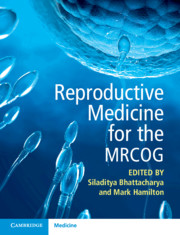Book contents
- Reproductive Medicine for the MRCOG
- Reproductive Medicine for the MRCOG
- Copyright page
- Contents
- Contributors
- Chapter 1 Epidemiology and Initial Assessment of the Infertile Patient
- Chapter 2 Disorders of Ovulation and Reproductive Endocrine Disorders Associated with Infertility
- Chapter 3 Endometriosis
- Chapter 4 Uterine and Tubal Causes of Infertility
- Chapter 5 Andrology and Infertility
- Chapter 6 Unexplained Infertility
- Chapter 7 Assisted Reproduction
- Chapter 8 Adjuvants in Assisted Reproduction
- Chapter 9 Laboratory Procedures for Assisted Reproduction
- Chapter 10 Fertility Preservation
- Chapter 11 Third-Party Reproduction
- Chapter 12 Managing Ethical Dilemmas in Reproductive Medicine
- Chapter 13 Evidence-Based Reproductive Medicine
- Chapter 14 The Organisation of Services and Quality Assurance in Fertility Practice
- Index
- References
Chapter 12 - Managing Ethical Dilemmas in Reproductive Medicine
Published online by Cambridge University Press: 25 February 2021
- Reproductive Medicine for the MRCOG
- Reproductive Medicine for the MRCOG
- Copyright page
- Contents
- Contributors
- Chapter 1 Epidemiology and Initial Assessment of the Infertile Patient
- Chapter 2 Disorders of Ovulation and Reproductive Endocrine Disorders Associated with Infertility
- Chapter 3 Endometriosis
- Chapter 4 Uterine and Tubal Causes of Infertility
- Chapter 5 Andrology and Infertility
- Chapter 6 Unexplained Infertility
- Chapter 7 Assisted Reproduction
- Chapter 8 Adjuvants in Assisted Reproduction
- Chapter 9 Laboratory Procedures for Assisted Reproduction
- Chapter 10 Fertility Preservation
- Chapter 11 Third-Party Reproduction
- Chapter 12 Managing Ethical Dilemmas in Reproductive Medicine
- Chapter 13 Evidence-Based Reproductive Medicine
- Chapter 14 The Organisation of Services and Quality Assurance in Fertility Practice
- Index
- References
Summary
Medical Ethics is increasingly recognised to be central to Good Medical Practice and the field of reproductive medicine presents some of the most challenging and complex issues of any branch of medecine. Scientific progress in ART has advanced so rapidly that Ethicists struggle to keep pace, but fertility clinicians can help to bridge the gap between clinical care and the sometimes ‘sci-fi’ world of the embryology laboratory. They can help patients benefit from developments that offer would-be parents the chance of a family without the risk of genetic disease and thereby advance one of humanity’s major goals. Society too is entitled to be engaged in the debate: the transition in just 42 years from in vitro fertilisation being a way of by-passing blocked Fallopian tubes to egg donation, egg freezing, womb transplantation, posthumous reproduction and CRISPR gene editing has raised issues that legislators struggle to explain and some faith groups strive to contain. As clinicians, we are confronted with the patient in the consulting room whom we long to help. We face a difficult balancing act between what is technically feasible, what is practically possible and what is ethically acceptable given resource and other restraints.This chapter is intended to help fertility clinicians achieve that balance.
- Type
- Chapter
- Information
- Reproductive Medicine for the MRCOG , pp. 136 - 146Publisher: Cambridge University PressPrint publication year: 2021



